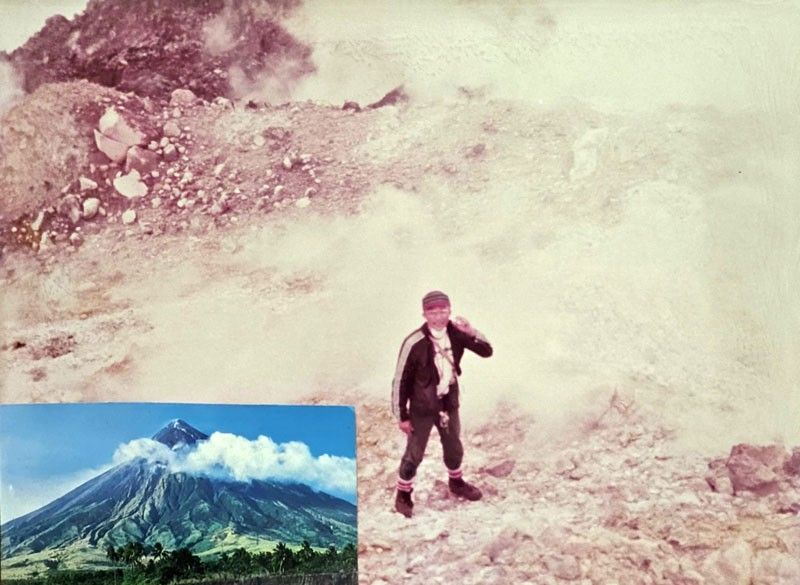‘The Peak and Me’


I want to celebrate a picture with my readers that is quite personal. It is something to celebrate with friends.
I consider my readers my friends. If they have followed me all these years or even once and found that some of my opinions on national economic development have some weight, then, especially, they are my friends. If they disagree with me from an honest point of view, they are still my friends.
Yesterday, I happened to look more closely at a picture on my library wall. I was mesmerized and bewitched by the timing. It put me on a celebratory mood, for it is a marking event in my life. It is a photograph of me on top of the peak of Mount Mayon almost exactly 40 years ago! I asked my son, Keith, to photograph it from the frame so I could share it with others.
I was standing in the middle of the cone of Mount Mayon, the volcano itself. It was a hot summer day. I was exposed to the wind in all directions. It was cool. There is a caption on the picture which said: “GERARDO P. SICAT on top of the cone of Mayon Volcano (1,819 ft. above sea level), at mid-day, April 19, 1983)! An inset on the left-hand-side is a small 1950s postcard photo of Mount Mayon, for proper context.
In my own estimate, the diameter across the cone was no more than seven or eight meters long. The smell of sulfurous smoke coming from the soft, almost low-cooking heat of volcanic ground, was unbearable. Standing on the cone floor felt like stepping on soft foam, in danger of sinking you.
The photo was clicked by a fellow climber, not by a photo professional. My image was blurred but there was clearer detail of the rocky wall of the volcano and of the clouds that emanated from the ground of the sulfurous cone on which I stood.
How I wish I could have shown a photo of four- or five-some among us who reached the peak. I could not locate the old photos from my well-hidden archives.
The stay at the top of the volcanic cone was celebratory but quick, only about twenty minutes. It could not be long for the safety of all. The sulfurous fumes were harsh to the lungs and to the eyes. We needed astronaut-type safety equipment that we did not have!
The downhill was more treacherous than the climb up the mountain. Early afternoon could turn to late afternoon quickly. Two dangerous things could happen on top: a rain shower from the mountaintop or darkness along the trail before reaching the campsite. A great danger, too, on this adventure were falling rocks from above, some of which was partly loosened by those on the trek ahead on the climb or by who were behind while getting down.
It took us two and a half hours of slow climb from our staging point which from the mid-peak of Mayon and almost an hour longer trying to get down from the peak. (The expert trekkers could do it more quickly, but amateurs like me posed the greatest cause of delay.)
To do the climb, young, capable, and experienced climbers from the U.P. Mountaineers Club helped in the journey. At the time, Art Valdez was their leader. The UP Mountaineers were vigorous and knowledgeable about their task. We got the idea to climb Mount Mayon after Art and the U.P. Mountaineers helped me go up to the peak of Mount Kanlaon in the island of Negros several months before. We spent the night on Mount Kanlaon. But on Mount Mayon, we stayed at the peak only twenty minutes in all. The terrain and the dangers between the two climbs were of different degrees.
Art Valdez became more famous. He organized the first Filipino group that eventually scaled Mount Everest a decade or so later. He was a mountaineering pioneer in the country.
In recalling this episode in my life, I also remember two persons who accompanied me to these trips. Angel was my driver during my stint in government. He was young and strong as a bull. He drove me around Luzon island on many trips where my duties took me.
The other person was Paul Encarnacion. The eldest son of Dean Jose Encarnacion of Economics, Paul was a close friend of my son Hans. They were both students of mathematics at UP when they studied. Paul became my assistant in my post-NEDA years. He would become a serious ultramarathoner for his life hobby. Professionally, he became an IT expert of the first order, which he practiced in the United States.
For archives of previous Crossroads essays, go to: https://www.philstar.com/authors/1336383/gerardo-p-sicat. Visit this site for more information, feedback and commentary: http://econ.upd.edu.ph/gpsicat/
- Latest
- Trending






























